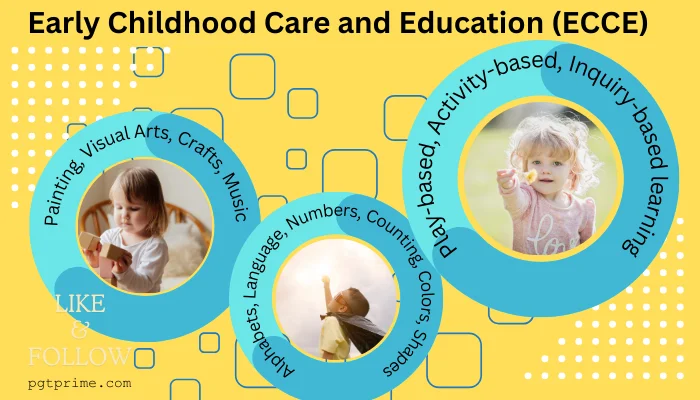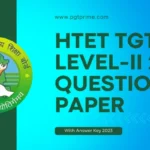Over 85% of a child’s cumulative brain development occurs before the age of six. This underlines the importance of early childhood care and education (ECCE) in India, highlighting the critical importance of appropriate care and stimulation of the brain in the early years.
These early years, often called formative years, lay the groundwork for a child’s Physical, Cognitive, Socio-emotional, and Language development. UNESCO which stands for United Nations Educational, Scientific and Cultural Organization also advocates for inclusive, holistic, and lifelong ECCE.
According to NEP 2020, what is the full form of ECCE?

National Education Policy (2020) viewed Early Childhood Care & Education (ECCE) as an integral input in the strategy of the Ministry of Education.
It is ensuring universal access to high-quality ECCE across the country in a phased manner through Anganwadis, Preschools, and Preprimary schools
Children who are well nurtured and cared for during their formative years develop their thinking, language, emotions, and social skills.
ECCE Age Group
Early childhood development mainly includes four major stages:
| Stages of ECCE | Age of child |
|---|---|
| Conception to birth stage | Birth to 1 year |
| Play & Motor sensory stage (Early childhood) | 1 to 3 year |
| Pre-school stage | 3 to 6 year |
| School stage (Foundational stage) | 6 to 8 year |
Each of these Stages requires age-appropriate support from the parent and the ECCE teachers to ensure the child’s full development. Investing heavily in ECCE programs can empower individuals to engage and thrive in their lifelong educational journey.
Objectives of ECCE
In India, the Right of Children to Free and Compulsory Education Act, which was implemented on April 1, 2010, has acknowledged the importance of Early Childhood Care and Education (ECCE) under Section 11.
The Indian Government, through the amendment of Article 45 of the Indian Constitution, has mandated the provision of ECCE for all children until they reach six years of age. However, quality ECCE is still inaccessible to millions of young children, especially those from socio-economically disadvantaged backgrounds.
Let’s find out what objectives the government has set regarding ECCE.

Ministries responsible for ECCE?
- Ministries of Human Resource Development (MHRD)
- Health and Family Welfare (HFW)
- Women and Child Development (WCD)
- Tribal Affairs
The main objective of ECCE is:
- Ensure optimal outcomes in the domains of development such as Physical, Mental, Cognitive, Socio-emotional, and Language development of a child.
- Imbibe good nutrition routines, health habits, and hygiene practices in children.
- Develop a sense of aesthetic appreciation and stimulate creative learning processes in School.
- Enable a smooth transition from home to ECCE center to formal schooling.
- Ensure each child is valued, and respected, feels safe and secure, and develops a positive self-concept.
- Facilitate comprehensive childcare support, infrastructure, and services for the well-being of children.
- Establish the quality standards and curriculum framework for ECCE provisions, and guarantee their implementation and adherence through enforcement and suitable institutional arrangements.
- Raise awareness and create a common understanding about the significance of ECCE and promote strong partnerships with communities and families
NIPUN Bharat Mission (2024): An Amazing Initiative in Education
Need and Importance of ECCE
Early child care, Stimulating environment, and optimum learning opportunities have a lasting impact on the lives of young children. This can be done by ensuring quality health, and education for all children during their formative years.
This is the most important part of life characterized by rapid growth and development. Thus ECCE refers to providing good health and nutrition as well as learning opportunities i.e. पोषण भी, पढ़ाई भी।.
The need and Importance of ECCE are based on:
- Lack of healthy home and school environments, a poor city of stimulation, inadequate nutrition, and poor health care are common factors that lead to developmental delays among children.
- ECCE programs enable children to acquire age-appropriate knowledge and skills that help them adjust better to a formal school environment.
- ECCE can reduce the risk of developmental delays, malnutrition, and diseases impairing a child’s brain function.
- From birth to 6 years of life is critical for the growth and development of the brain, which affects the cognitive, social, emotional, and physical abilities of the child.
- ECCE can enable children to explore, experiment, observe, participate, and interact with others.
- ECCE promotes the diversity of children and their inclusion and participation.
Top 35 NIPUN Bharat MCQ for Competitive Exam.
How to improve the quality and accessibility of Early Childhood Care and Education
The Government of India has taken several initiatives to improve the quality and accessibility of Early Childhood Care and Education (ECCE). Here are some key initiatives:
- SAKSHAM Anganwadi and POSHAN 2.0: The existing scheme components have been re-organized under Poshan 2.0 into the primary verticals: Nutrition Support for POSHAN through Supplementary Nutrition Programme (SNP), Early Childhood Care and Education [3-6 years] and early stimulation for (0-3 years), Anganwadi Infrastructure including modern, upgraded Saksham Anganwadi, and Poshan Abhiyaan.
- Integrated Child Development Scheme (ICDS): This is an integrated nutrition support program, and ECCE is an integral component of this program.
- Strengthening Teaching-Learning and Results for States (STARS) Project: This project aims to improve the quality and governance of school education in six Indian states.
- National Education Policy (NEP) 2020: The NEP 2020 recommends four models for implementation of quality ECCE, these are Anganwadi centers in communities, Anganwadi centers located within school premises, pre-primary sections in schools, and standalone pre-schools.
Embrace the change with NEP 2020 highlights.
ECCE in NEP 2020
The National Education Policy (NEP) 2020 is designed to provide universal access to high-quality Early Childhood Care and Education (ECCE) across India.
The policy specifically targets children in the age bracket of 3-8 years, bifurcating it into two distinct stages:
1. Children aged 3-6 years under the ECCE
2. Children aged 6-8 years, encompassing Class I and II in primary school.
This strategic focus aims to ensure a comprehensive and effective educational foundation for children in their early years.
According to NEP 2020:
- No child would be subjected to an admission test, written or oral for granting admission to an ECCE center.
- ECCE program is of 3 to 4 hours duration.
- One classroom measuring at least 35 square meters for a group of 30 children, and availability of adequate 30 square meters of outdoor space for a group of thirty children.
- Adequate trained staff.
- Age-appropriate curriculum.
- Medium of instruction must be in mother’s tongue and local language.
- Sufficient toys and learning resources, which is suitable for the child’s developmental stage.
- Adequate and separate child-friendly toilets and handwash facilities for girls and boys.
- At an ECCE center, the recommended caregiver-to-child ratio should be 1:20 for children aged 3 to 6 years and 1:10 for children under 3 years of age.
NEP 2020 MCQ: Assess Your Knowledge of New Education Policy.
Role of Play in ECCE
Play provides a learning opportunity to all children during their formative years for their overall development. Play enriches a child’s brain, body, and life.
Play can be sensory, neuromuscular, cognitive, or any combination. Play involves repetition of exercise, exploration, experimentation, and limitations of one’s surroundings.

Categorization of play stage-wise in ECCE.
Infants
- The infant enjoys rocking, strolling, time spent in a swing, time on a blanket, and on the floor crawling.
- Infants are engaged in the vigorous process of self-discovery, learning their world by looking listening, chewing, smelling, and grasping.
- Enjoy playing with the parent’s fingers & face and their body parts playing in the water and games like peek-a-boo.
- Parents can give them water toys for the bath, safe kitchen utensils, and a large print box.
Toddlers
- They enjoy feeling different textures exploring, the home environment, and mimicking others.
- They like to read and look at colorful books, and televisions.
- They enjoy manipulating small objects such as toy people, cars, and animals.
- They love mechanical objects of different textures such as clay, sand, bubbles, large balls, blocks, coloring with large crayons, visible toys, and large puzzles.
Pre-Schoolers
- This age group likes to run, jump, and hop endlessly.
- Play is simple and imaginative for them, they like to build and create sandcastles or mud pies.
- They enjoy riding toys, building materials, drawing materials books, puzzles, videos, rhymes, and singing games.
- They love to pretend to be somebody’s and wear their dress.
Play builds imagination and creativity, fosters cognitive growth, improves literacy, encourages greater independence, and also promotes physical fitness.
Educational Current Affairs (2023-24): Help to Score Ultimate Marks.
ECCE Curriculum Framework
The national ECCE curriculum frameworks for all children below six years of age are aligned with the Government’s Vision of ECCE as spelled out in national early childhood care and education policy.
Children in the first three years have to receive preschool education in Anganwadi, the starting age is 3, and for the next two years, children will be taught in 1st and 2nd classes in school. Earlier this system was not there in preschools run by Government Schools.
- The Government has proposed to roll out the early childhood care and education ECCE program in all Anganwadi centers in a phased manner beginning the financial year from 2021 to 2022.
- It will cover up to 20% of the Anganwadi centers each year over the next five years.
- It will create a blueprint to modernize Anganwadis and strengthen them as early childhood institutes to ensure universal access to ECCE.
- It will include training the Anganwadi teachers and workers, for this 2,00,000 Anganwadi centers are created named as “Saksham Angadwadi’s.”
- Year-wise activity books for children of three to six years of age are to be developed, What the child needs to learn or how the child will get access to the information along with these activities in which the child engages to make them master the content.
- When the child is comfortable and proficient with their mother tongue that supports developing proficiency in the second language later.
KVS PGT Syllabus (2024): Best Step Towards Exam
What is ECCE in Education
The activities in school are planned and organized according to the principles of early learning and development.
In Literacy
Writing, through Games and puzzles, Scribbling, Colouring, and tracing worksheets.

1) Improve Reading and Recognition (A-Z) through Flash cards, Building blocks, Plastic letters, play dough activities, and Alphabet Matching Activities.

2) Vocabulary Building through exploration of things all around us such as picture dictionaries, Boardbooks, and Storybooks.

3) Improve Fluency through Phonics songs, rhymes, and Storytelling activities.
In Numeracy
Writing, through Games and puzzles, Scribbling, Colouring, and tracing worksheets.
1) Improve Identification and Recognition (1-20) Numbers through jumbo cards, Dot flashcards, Building blocks, Plastic numbers, play dough activities, and Number Matching Activities.

2) Recognition of Shapes through shape cutouts, Arts & crafts activities of Shapes, Colouring shapes

3) Identification of color, comparison, and number sequence through crayons, matching cards, and real objects.

ECCE literacy and numeracy are essential for children’s future learning and success in school and life.
Lucrative KVS PGT Salary Structure (2024) For Teachers
ECCE Course in IGNOU
IGNOU provides a diploma in early childhood care and education (DECE). It is a unique package that equips the learner to foster the holistic development of young children from birth to six years of age. Its duration is for one year.
ECCE Course Duration

| Course Code | Title of the Course | Duration |
|---|---|---|
| DECE 1 | Organizing childcare services | 1 Year |
| DECE 2 | Child health and nutrition | |
| DECE 3 | Services and programs for children | |
| DECE 4 | Project work: working with young children in a childcare setting |
ECCE Course Fees
This course is provided in three languages English, Hindi, and Tamil, and the fee for this course is less than Rs. 4000/-. Project work is a vital component of this program where a learner has to identify a preschool center.
It is important to go through a practical session of 30 working days to execute the project assignment. It helps to set up, manage, and work in child-care centers such as crèches, preschools, nursery schools, kindergartens, and daycare centers.
The Latest KVS PGT Eligibility (2024) for Aspirants
ECCE Teacher Training Course
ECCE courses are available online as well as offline in different formats and durations, such as six months, and one year.
- ECCE opens up career opportunities, such as Preschool Teachers, Childcare Workers, Kindergarten Teachers, Activity Coordinators, Curriculum Developers, and more.
- It enhances personal and professional growth, as one learns from Peers, Mentors, and Experts in this field of Early Childhood Education.
ECCE Teacher Training Course:
| Degree/Diploma in ECCE | Eligibility |
|---|---|
| Duration | 6 months, 1 year |
| Minimum Percentage | 50% in 10+2 Examination |
| Similar Options of Study | Diploma in Child Psychology, Diploma in Child Development |
| Employment Roles | Kindergarten Teacher, Elementary Teacher, Educational Material consultant, etc. |
| Placement Opportunities | Montessori Playschool, Private preschools, Government schools (Central & State), Anganwadis, Ministry of Child and Women Empowerment. |
| Specific Subject Required | Not Specified |
| Average Approx. Salary | INR 3 – 6 LPA |
ECCE courses prepare teachers to address the diverse needs and abilities of children and enable teachers to plan and organize appropriate activities for the children.
Mark Your Success With PGT Eligibility 2024
I highly recommend this article by M/s Drishti IAS for detailed information about ECCE. Please click here to learn more.
Frequently Asked Questions
Is Montessori and ECCE the same?
No, Montessori and ECCE are not the same. Montessori is a specific pedagogical approach to early childhood education, based on the principles and methods of Maria Montessori.
What is the qualification of an ECCE Teacher?
Diploma in Early Childhood Care and Education.
Please let us know through the comment section if you want any topic to be discussed in this blog. We will try to provide an article on that subject as early as possible.
Please leave your valuable comment in the comment box! Your comments are valuable to us.












Very good information